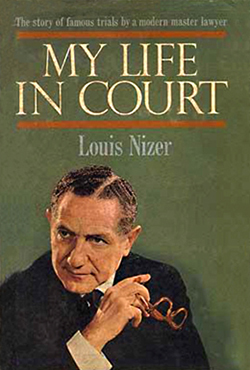Reception
The book was received favorably. Commentary magazine reviewer David T. Bazelon said he did not "understand why it has become a bestseller", but all in all "Properly read, it is an occasion for some real understanding of the trial man. Haphazardly or naively read, it is interesting, instructive, and even exciting." [9] Bazelon challenges praise by Max Lerner that the work is "one of the great legal autobiographies of our time". [9] Kirkus reviews gave less praise, calling the book "direct and orderly" and enjoyable by "Trial lawyers, law students, and the general public". [4]
For the most part, academic and legal reviewers of the autobiography were particularly harsh critics of the book. In The Modern Law Review, British reviewer C.P. Harvey commented "I cannot help wondering what made Messrs. Heinmann think it would be good business to publish this book in [the United Kingdom]." [10] He writes "I pronounce this book to be didactic, long-winded and pretentious" and describes it as an example of "the breadth of the ocean which lies between the English and American legal systems." [9]
In the Osgoode Hall Law Journal , reviewer R. N. Starr described the work as not exactly realistic, and taken to "poetic license". [11] His review is rather skeptical and mixed; he writes: "For my own part I would have preferred it, had Mr. Nizer put his wide experience to other purposes." [11] In the Yale Law Review Joseph W. Bishop lambasts the piece as demonstrating the decline of legal practice, jury tried cases, and the flaws of the legal profession. [6] Nonetheless, he describes the book as anything but "dry and indigestable reading" which is usually the case for accounts of legal cases. [6]
Unlike other academic reviewers, American Bar Association Journal reviewer Alfred Schweppe praised the book as a "must for every lawyer searching for an answer to success in the courtroom" and then describing the style as "Moving with an easy finished prose". [8]
This page is based on this
Wikipedia article Text is available under the
CC BY-SA 4.0 license; additional terms may apply.
Images, videos and audio are available under their respective licenses.
